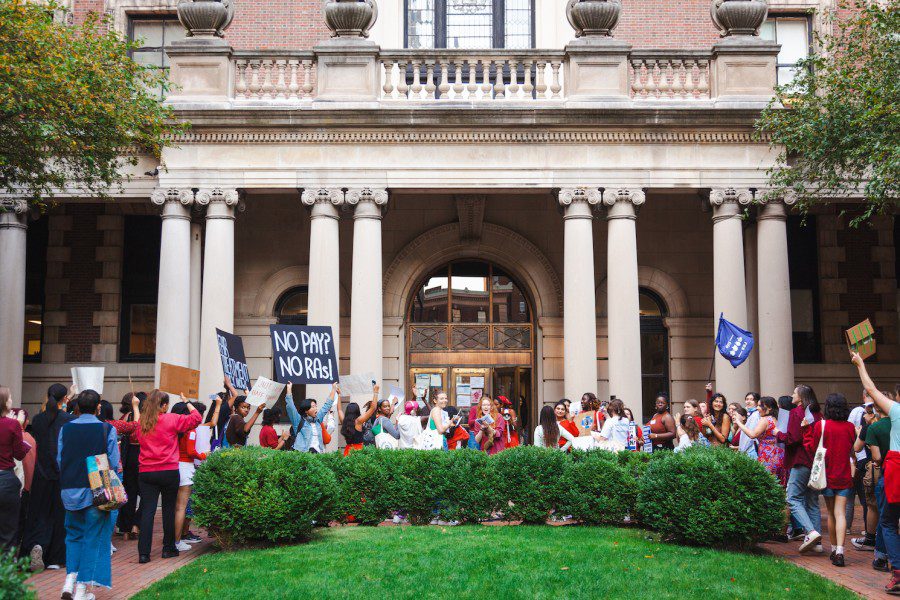Barnard RA union to meet with administrators this week
After months of organizing, resident assistants at Barnard College formally asked the university to recognize them as a union. The group will meet with administrators on Thursday, Oct. 13.
Barnard College resident assistants want the university to formally recognize them as a union. (Photo by Alexandra Chan)
October 12, 2022
Frankie Fierro has been a resident assistant at Barnard College since fall 2022. She took on the job because she wanted to find a community on campus and connect with her classmates — an aspect of university life that she said was missing from her first year due to the pandemic. However, Fierro said that the way in which the university has treated her and other RAs has dampened her enthusiasm about the position.
“We are so burnt out,” Fierro said. “We are so frustrated with dealing with an unresponsive admin team over and over again. It really makes you feel like, ‘What’s the point?’ You want a team of RAs that are bringing the energy, but if they feel like their time and labor are not recognized, that is not conducive to making a strong team.”
As part of a growing movement among undergraduate workers at universities across the country, RAs at Barnard — including Fierro — have officially formed a union after months of organizing. They are now calling on the college to formally recognize them. After filing with OPEIU Local 153, a union that represents more than 100,000 workers across four states, the group delivered a petition signed by 95% of RAs on campus and gave the college five days to respond.
If the university voluntarily recognizes the union, RAs will be able to negotiate the terms of their employment — including working conditions, compensation and benefits — during collective bargaining sessions with the college. As of Tuesday, Oct. 11, the university and the union set a time to meet on Thursday, Oct. 13. RAs, national union representatives and administrators will be present at the meeting and will discuss the union’s demands.
Aditi Misra, the lead organizer of the union and a Barnard senior, has been an RA at the college every semester, including summers, since spring 2021. She said the union focuses on three main priorities: ensuring more comprehensive compensation for RAs through a wage or stipend-based agreement, managing the time spent each week on RA responsibilities, and improving college communication about responsibilities to employees.
The fall 2022 job description for the RA position states that work related to the job “must not exceed a total of 20 hours each week” unless additional hours are approved by a supervisor. However, Misra said that employees often spend additional hours conducting room inspections, holding one-on-one meetings at the beginning of the semester, organizing programming for residents and more. She said that RAs deserve to also be paid for all of those hours.
“Departments of residential life across the country are exploiting student workers who want to be a support system for their community,” Misra said. “Just because this is something you elected to do, doesn’t mean that you don’t deserve to be fairly compensated for your labor.”
Misra added that she receives financial aid, meaning that the two forms of compensation offered to RAs — free housing and a complimentary meal plan — would be covered by her aid whether she was an RA or not. Some RAs have reported their aid decreasing as a result of their position.
“At the end of the day, I’m doing this work for free,” Misra said.
Fierro and Misra both said that they have had complaints about working conditions and compensation for several semesters, but issues culminated just before last summer. In May, RAs were informed that they would not be given a meal plan with their employment — a benefit that had been offered to employees every semester prior, according to Misra.
It was not until several of the RAs working during the summer session threatened to strike that the university scheduled a meeting, which nearly all of the RAs attended. The university offered the employees a delayed meal plan to begin in mid-June, and gift cards from the food ordering service Seamless to account for the missing time.
Last week, a group of RAs, including Misra, personally delivered a letter demanding that the university acknowledge the union to Barnard president Sian Beilock’s office on Oct. 3.
The union received an email on Oct. 7 from Leslie Grinage, the vice president for Campus Life and Student Experience, and the dean of the college. She informed the RAs that Beilock had shared the letter with her, but that the college needed more time to deliberate.
“I want to emphasize that Barnard deeply values our Resident Assistants and the undergraduate community this distinctive program fosters,” Grinage wrote in the email. “The college is committed to ensuring our RAs have the best possible experience in their roles and realize the full developmental benefit the program has long offered. We are reviewing the information presented by the RAs and will respond to your outreach next week when we have had sufficient time to consider your request.”
Scott Williams, an organizer with OPEIU Local 153 who has worked closely with the RA union’s organizing committee, said that the Barnard RAs efforts are representative of a flood of undergraduate workers organizing across the country.
“On every campus across the country, undergraduates are working and they’re adding tons of value to the university experience,” Williams said. “But oftentimes, they’re not paid for it, or they’re paid less than they deserve. That’s a trend among undergraduates, among graduates and among adjuncts across the entire university system. People are doing work and they’re not even recognized as workers.”
RAs formed the Wesleyan Union of Student Employees after decades of organizing efforts at Wesleyan University in Connecticut. Their union was the first undergraduate union to be voluntarily recognized after the university formally acknowledged the group in March. The unionization has led to several other groups of resident assistants organizing across the country, including at Mount Holyoke College and Grinnell College.
RAs at NYU organized a petition in 2020 that criticized the university for not sufficiently communicating with them about building assignments and COVID-related safety measures. Seven hundred and thirty people signed the document, which listed demands including hazard pay and accommodations for immunocompromised students and staff.
The petition cited a 40-page document written by alum Ary Reich, who was an RA in spring 2019. It listed complaints about the position — addressing mental health resources, compensation and mistreatment of employees — and included a Google form where community members could submit their concerns about the position. The document was met with support from other RAs, some of whom came forward with their own safety concerns afterward.
After a 10-week strike last winter, Student Workers of Columbia — a union representing approximately 3,000 undergraduate and graduate student workers at Columbia University — reached a contract with the university, which included wage increases and benefit improvements. The union’s contract went into effect on Jan. 28.
The union hosted its first public rally on Friday, Oct. 7, drawing more than 200 participants including RAs, Barnard students, alumni and representatives from other unions. The group marched across Barnard’s campus, ending at Beilock’s office, and joined in chants including “Tick Tock, Beilock” — an allusion to the president’s delayed response to the petition and the conclusion of her term at the college at the end of this academic year.
Misra said that she was impressed by the rally’s turnout, and said she was grateful for the outpouring of support for the previously private unionization effort.
“The reason that we are seeing this trend of unionization of student workers across the country is because we are finally realizing that the labor that we’re doing deserves to be under conditions that allow us to also grow,” Misra said. “We are providing support for our community, which is great, but in turn, we deserve that support from our supervisors. If you feel that you are not getting that, you need to fight for it because that is something you deserve.”
Contact Abby Wilson at [email protected].

























































































































































